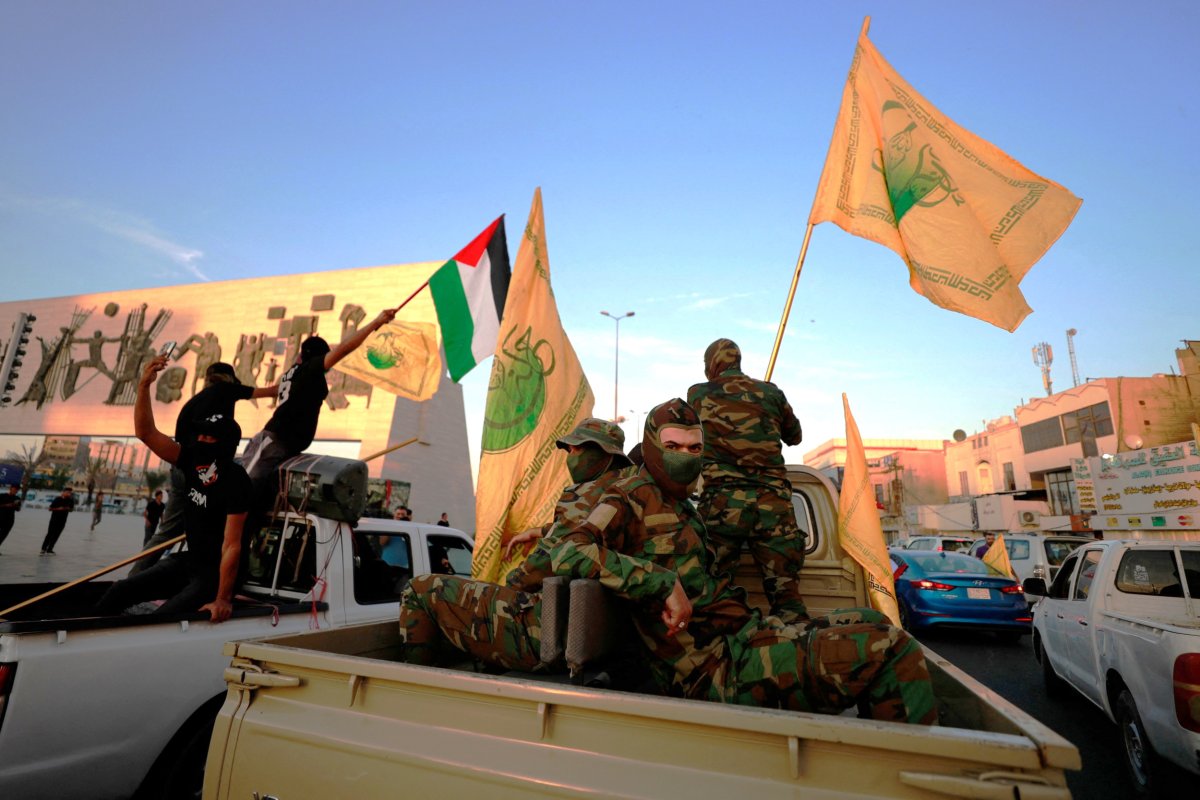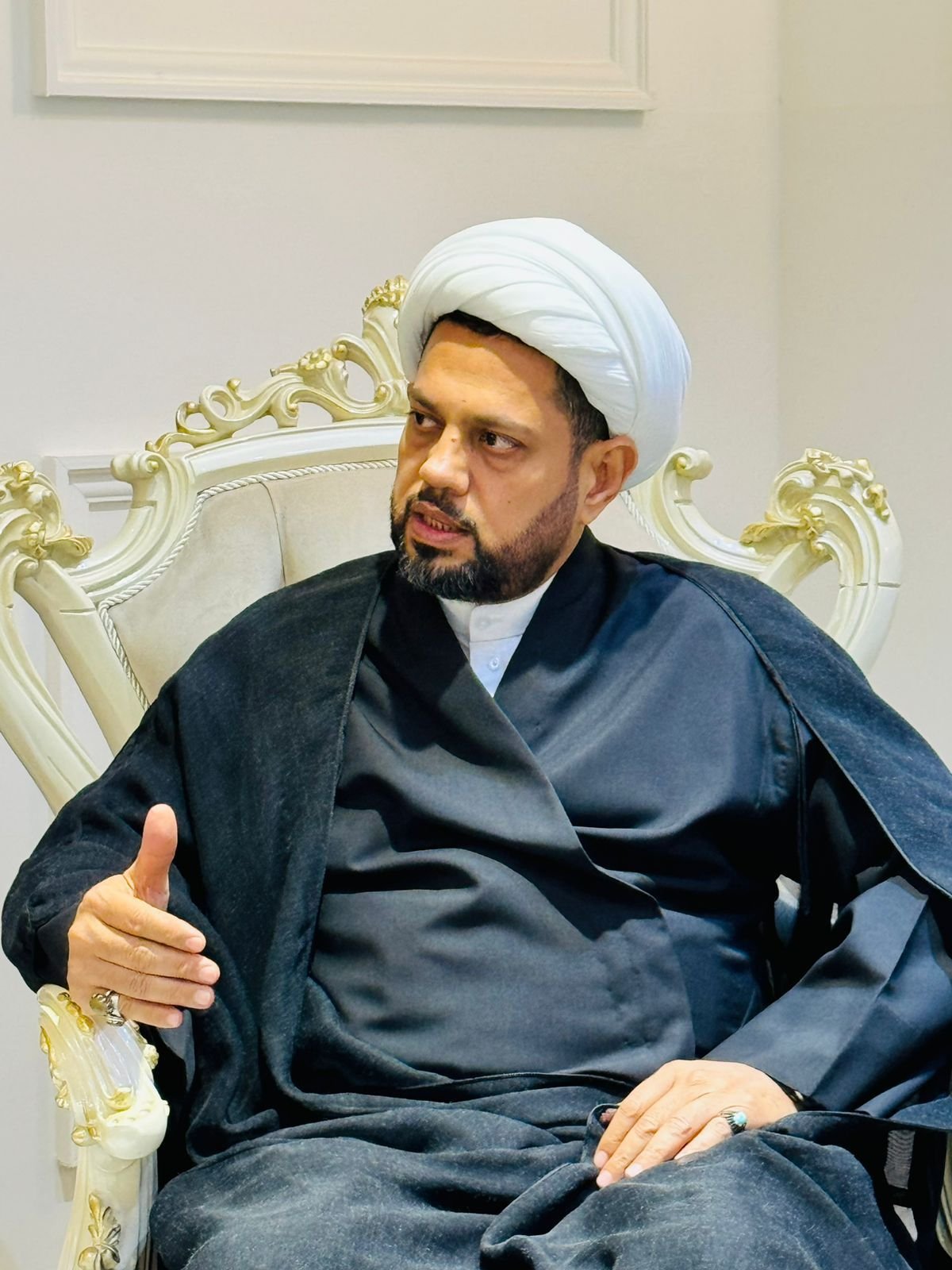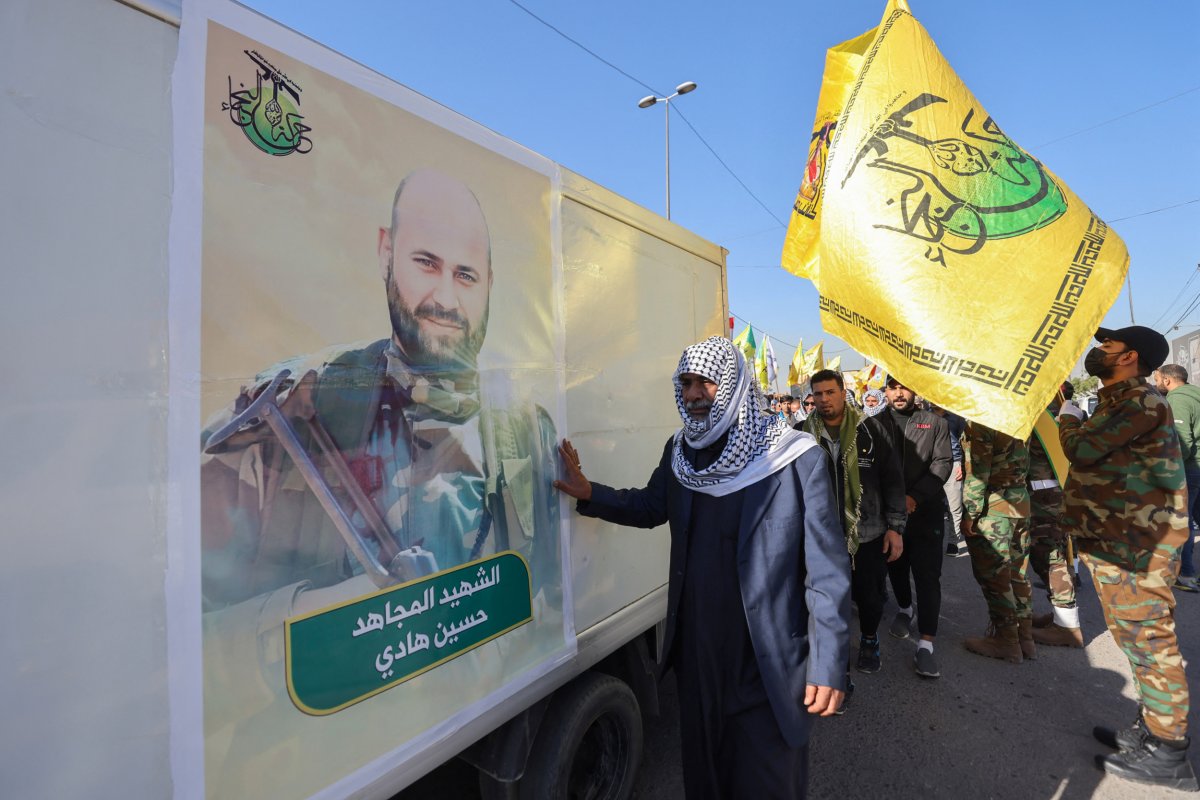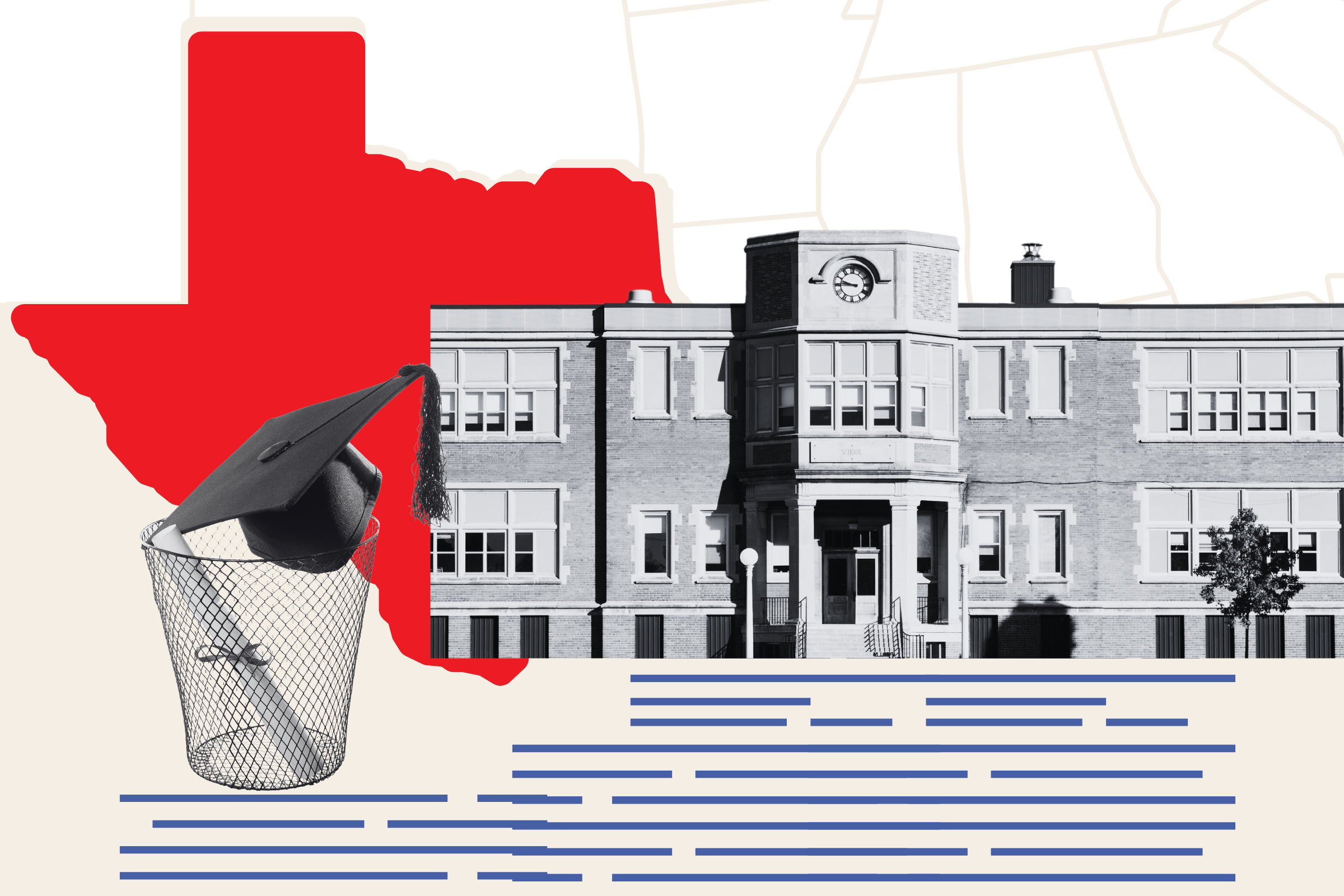The political chief of a powerful Iran-backed Iraqi militia engaged in an ongoing series of attacks against U.S. troops in response to Israel's war in the Gaza Strip has issued a new, direct warning to President Joe Biden in a rare, exclusive interview with Newsweek.
"Our message to Biden is to withdraw your forces from the region and preserve what remains of your presence, because you will withdraw in humiliation from the strikes of the Axis of Resistance, and [your forces] will reach their families in scattered pieces," Sheikh Ali al-Asadi, chair of the Nujaba Islamic Resistance Movement Political Council, told Newsweek in his first comments to Western media since the offensive was launched against U.S. forces in mid-October.
The "Axis of Resistance" is a term used to refer to a broad, informal coalition of Iran-aligned groups opposed to Israel and the presence of the U.S. military in the Middle East. It includes mostly Shiite Muslim formations, though a number of Palestinian Sunni Muslim factions, including Hamas and Islamic Jihad, have also forged close ties with it.
In Iraq, the Nujaba Movement, also called the Hezbollah al-Nujaba Movement, is one of several militias acting under the banner of the "Islamic Resistance of Iraq" that has claimed more than 75 rocket and drone attacks against U.S. troops in Iraq and Syria since an unprecedented Hamas-led surprise attack against Israel sparked the latest and deadliest-ever war in Gaza exactly two months ago.
As Israeli forces pressed on with their most intensive campaign in Gaza to date, the U.S. has also conducted airstrikes against Iraqi militias tied to Iran, most recently killing five members of the Nujaba Movement on Sunday. Now, Asadi asserted that his group and others allied with it were preparing to ramp up their campaign against U.S. forces as the conflict in Gaza continued to inflame regional tensions.
"The truth is that the movement and the Axis of Resistance have set an escalation schedule with this war, which America is directly leading, and there will be surprises that America did not expect from the Axis of Resistance," Asadi said. "The axis has arranged its situation to fight a long-term battle, and we believe that America is now going through its weakest state, and they do not have the ability to negotiate."

In parallel with military actions, the U.S. has sought a diplomatic path to address the growing instability in the region. But Asadi saw such developments as the recent travel of U.S. special envoy for Yemen Tim Lenderking to the Persian Gulf as "evidence" of a floundering U.S. policy.
Asadi raised the case of Yemen in particular, where U.S. warships have confronted missiles and drones launched toward Israel by another powerful Axis of Resistance faction known as Ansar Allah, or the Houthi movement. Here, he said U.S. officials "are begging and offering temptations in order to restrain the axis towards war, and all their temptations have failed."
With threats to the U.S. and Israel simultaneously emanating from Iraq, the Nujaba Movement represents one of the most prominent of an array of armed militias that have risen up with support from Iran since the U.S.-led invasion that toppled longtime President Saddam Hussein two decades ago. These groups, which also include Asaib Ahl al-Haq, Kataib Hezbollah and Kataib Sayyed al-Shuhada, among others, have sought to both expel U.S. troops as well as combat rival Sunni Muslim insurgent forces such as Al-Qaeda and the Islamic State militant group (ISIS).
Established in 2013 by former senior Asaib Ahl al-Haq member Sheikh Akram al-Kaabi, the Nujaba Movement played a front-line role in the Popular Mobilization Forces, an Iraqi state-backed institution serving as an umbrella for Iraq's many anti-ISIS militias. The Nujaba Movement achieved particular success in its fight against the jihadis in neighboring Syria.
The multinational war against ISIS was backed by both the U.S. and Iran, but worsening tensions between the two powers led to renewed frictions on the ground in 2019. A deadly cycle of escalations that year culminated in the U.S. killing of Iran's Islamic Revolutionary Guard Corps Quds Force commander Major General Qassem Soleimani and Popular Mobilization Forces deputy chief Abu Mahdi al-Muhandis in a January 2020 airstrike at Baghdad International Airport.
Iraqi militias such as the Nujaba Movement continue to seek vengeance over the slaying of the revered commanders, and the war in Gaza has proven a new catalyst for violence. In response to the latest U.S. attack on his forces, Kaabi asserted that "declaring war and the humiliating expulsion of America from Iraq is now obligatory for all" in a statement published to the group's Iran-based website.
Asadi, for his part, outlined the objectives of this armed campaign to Newsweek.
"The goal is to create public opinion against the brutal massacres carried out by the gangs of the Zionist entity and to put pressure on the political and military sides in order to reduce the pressure on our people in Gaza," Asadi said, "as well as to strike the Zionist-American project."

As for the Nujaba Movement's relationship with partnered forces in the region, including the Islamic Resistance in Iraq and the Islamic Republic of Iran, Asadi said that "cooperation between the movement and the Axis of Resistance has reached the highest levels."
"The coordination of positions continues, and the arenas are united for all at the internal Iraqi level, as well as the rest of the axis countries," Asadi said, declaring that "the Islamic Republic of Iran is a moral supporter of all global liberation factions and movements."
Iraq, however, counts both the U.S. and Iran as security partners. Amid the growing turmoil, Iraqi officials have condemned both the U.S. and local militias for launching attacks without the consent of central authorities, who fear that the war in Gaza could spread to Baghdad.
Iraqi Prime Minister Mohammed Shia al-Sudani has sought to strike a careful balance since the onset of renewed hostilities as U.S. officials urged his administration to rein in unsanctioned militia activities, including among units of the Popular Mobilization Forces.
Though the Nujaba Movement officially constitutes the 12th Brigade of this paramilitary coalition, Asadi said that the Popular Mobilization Forces itself "is a government institution that takes its orders from the commander-in-chief of the armed forces and is not involved in the battle."
He also acknowledged the concerns expressed by Iraqi officials and counted on their solidarity with the broader cause in support of Palestinians.
"We understand the fears surrounding the Iraqi government, and they are based on the government's knowledge of the Iraqi reality and the Iraqi people, who consider the issue of Palestine a central issue, and all the Iraqi people, of all sects and traditions, interact with it," Asadi said.
"This was made clear by the Iraqi prime minister in the Cairo conference held in connection with the attack on Palestine," he added, "and we trust the government that it will act wisely towards this matter."

The worsening unrest in Iraq came as the war in Gaza showed little sign of abating. Israeli Prime Minister Benjamin Netanyahu has asserted that he would not end the offensive until Hamas was entirely defeated, even as mounting civilian casualties continue to raise international concern and put growing pressure on both Israel and the U.S.
The prospect of greater U.S. military action in Iraq also poses a potential dilemma for Biden. Like his predecessor and potential 2024 election rival, former President Donald Trump, Biden has vowed to end an era of "forever wars" in the Middle East and, after overseeing the withdrawal from Afghanistan, declared an end to the U.S.-led combat mission in Iraq two years ago.
Still, up to 2,500 U.S. troops remain in the country in partnership with the Iraqi government as part of a lasting security agreement against ISIS. While the Biden administration has expressed little desire to become mired in a new long-term conflict in Iraq, the war in Gaza has already prompted the heightening of the U.S. force posture across the Middle East and U.S. officials have repeatedly warned they would target any entities taking aim at U.S. troops across the region.
Newsweek has reached out to the White House for comment.
Asadi addressed Biden's approach to Iraq directly, noting the president's attempts to distance himself from the 2003 invasion along with his current strategy of expanding U.S. strikes on militias attacking U.S. forces.
"As for his contradictory positions, as he was previously opposed to the war and now he is leading it," Asadi said, "this contradictory policy is one of the characteristics of the American hybrid policy."
He warned U.S. efforts to defeat the Nujaba Movement and other Axis of Resistance forces in Iraq would not be any more successful than past attempts at securing a military victory in the country.
"You have tried this before," Asadi said, "and now the resistance is stronger and more prepared."
Uncommon Knowledge
Newsweek is committed to challenging conventional wisdom and finding connections in the search for common ground.
Newsweek is committed to challenging conventional wisdom and finding connections in the search for common ground.
About the writer
Based in his hometown of Staten Island, New York City, Tom O'Connor is an award-winning Senior Writer of Foreign Policy ... Read more
To read how Newsweek uses AI as a newsroom tool, Click here.








